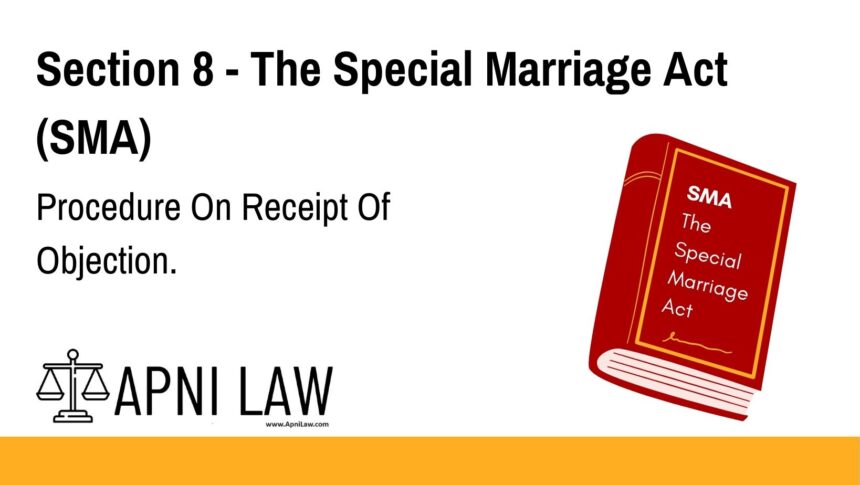Code: Section 8
(1) If an objection is made under section 7 to an intended marriage, the Marriage Officer shall not solemnize the marriage until he has inquired into the matter of the objection and is satisfied that it ought not to prevent the solemnization of the marriage or the objection is withdrawn by the person making it; and where the objection is not withdrawn, the Marriage Officer shall hold the inquiry within thirty days from the date of the objection.
(2) The Marriage Officer may, at the time of the inquiry, summon any person whose presence appears to him necessary to be present and may examine such person on oath.
(3) The Marriage Officer shall record in writing the findings of the inquiry and the reasons for the decision in the matter and shall furnish a copy thereof to the parties.
(4) If the objection is upheld and the Marriage Officer refuses to solemnize the marriage, either party to the intended marriage may, within thirty days from the date of such refusal, appeal to the district court within the local limits of whose jurisdiction the Marriage Officer has his office, and the decision of the district court on such appeal shall be final.
—
Explanation of Section 8 of the Special Marriage Act, 1954
Section 8 outlines what happens when someone objects to a marriage. It lays down the steps the Marriage Officer must follow before deciding whether the marriage can proceed.
Key Provisions:
- Suspension of Marriage
When an objection is raised, the Marriage Officer must pause the process. The marriage cannot move forward until an inquiry is completed. - Inquiry and Resolution
The Marriage Officer must conduct a formal inquiry within 30 days from the objection date. During this inquiry, the officer may summon witnesses and collect evidence. - Written Decision
After the inquiry, the Marriage Officer must write down the findings and explain the reasons for the final decision. A copy of this report must be shared with both parties. - Right to Appeal
If the officer refuses to solemnize the marriage, the couple has a legal right to appeal. This appeal must be filed within 30 days in the local district court. The decision of the district court is final.
This process ensures that objections are handled fairly and promptly while giving both sides a chance to present their case.
—
Illustration
Example 1:
Ananya and Sohail plan to marry under the Special Marriage Act. Someone objects, claiming Sohail is already married. The Marriage Officer investigates, questions both parties, and checks official records. After reviewing all details, the officer concludes the claim is false and allows the marriage to proceed.
Example 2:
In another case, someone objects that the groom is underage. The officer confirms the objection through valid documents. He records the findings and refuses to solemnize the marriage. The couple can challenge this decision in district court within 30 days.
—
Common Questions and Answers on Section 8 SMA
- What happens after someone objects to a marriage?
The Marriage Officer must conduct an inquiry before proceeding. The process includes hearing both sides and examining evidence. - How long does the inquiry take?
The officer must complete the inquiry within 30 days from the date the objection was made. - Can witnesses be called during the inquiry?
Yes. The Marriage Officer can summon and question any person under oath if needed. - What if the officer refuses to solemnize the marriage?
Either party can appeal to the district court. The appeal must be filed within 30 days of the refusal. - Is the district court’s decision final?
Yes. Once the district court makes a decision on the appeal, it is final and binding.
—
Conclusion
Section 8 strengthens the integrity of the marriage process under the Special Marriage Act. It ensures that all objections are handled lawfully, within a clear timeframe. Most importantly, it protects the rights of the individuals involved by offering a fair hearing and the right to appeal.
For legal advice or assistance with your marriage application, explore resources and expert help at ApniLaw.








